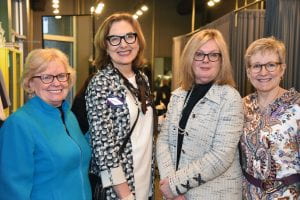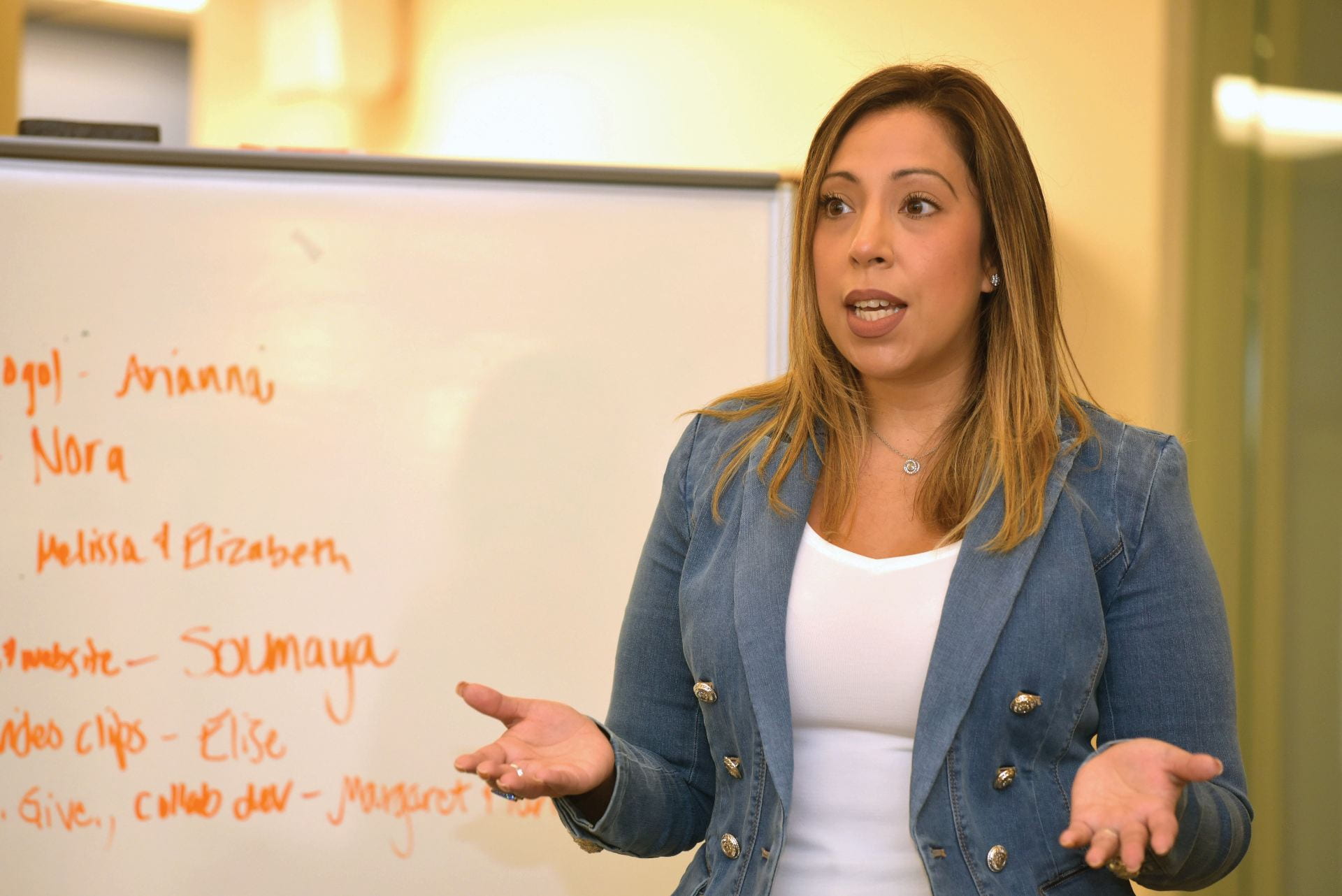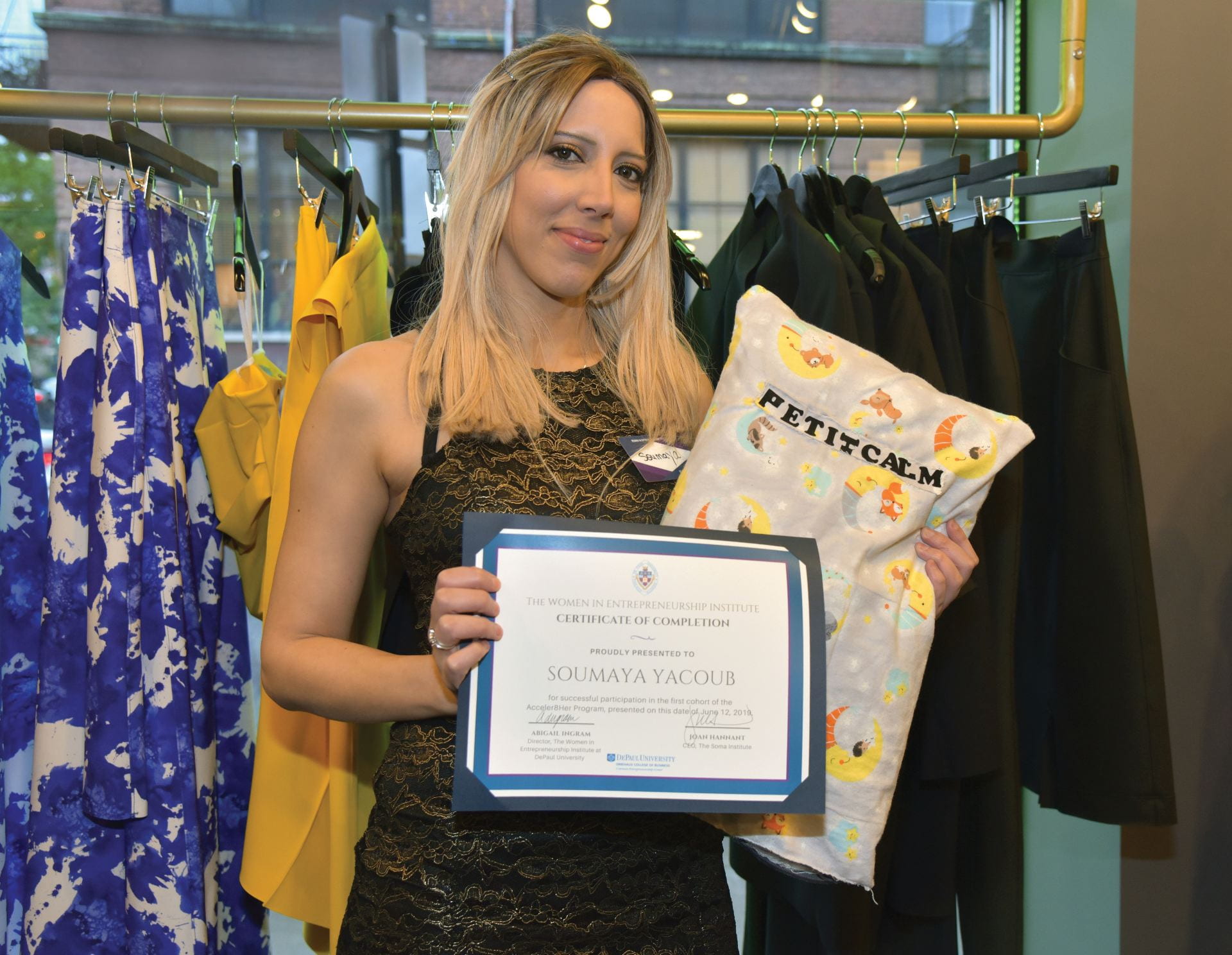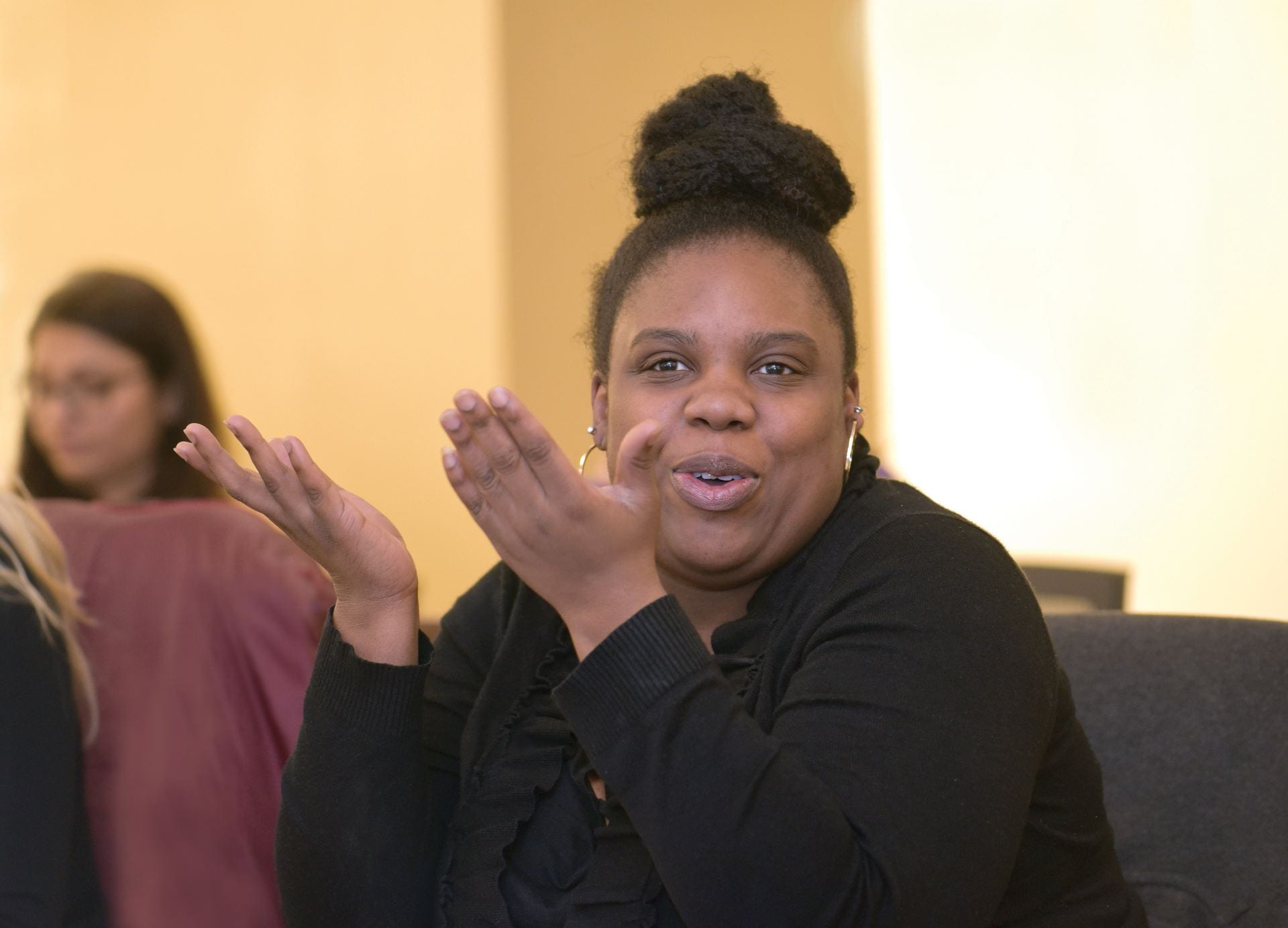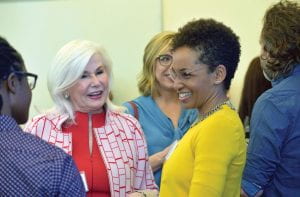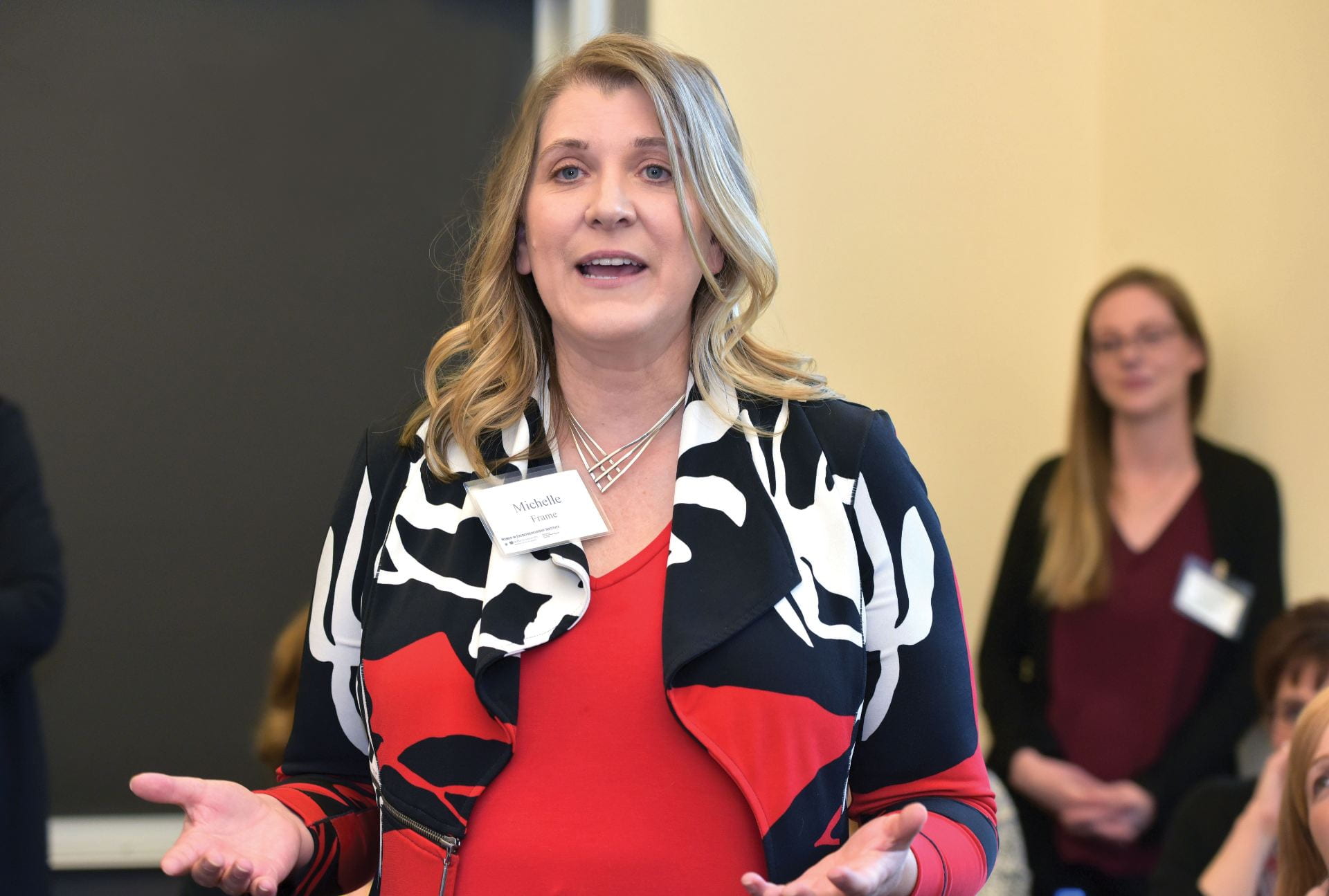
Women business founders in the first WEI accelerator cohort celebrate completing the program (left to right): Jennifer Spraggins (MBA ’18), Melissa Ames, DePaul student Parker English, Margaret Bamgbose, Soumaya Yacoub, WEI director Abigail Ingram (LAS MA ’15, JD ’18), Elise Gelwicks, Nika Vaughn, Elizabeth Ames-Wollek (MBA ’15), Nora Wall and Michelle Frame. Not pictured: Ariana Lee (BA ’19)
It’s week seven of the new business accelerator program initiated by the Women in Entrepreneurship Institute (WEI) at DePaul. Eleven women business founders in the program’s inaugural cohort have gathered on this Friday morning in May to learn how to launch or grow their businesses. Their teachers and mentors are successful Chicago women entrepreneurs—including DePaul alumni—who support WEI, a newly established institute at the Coleman Entrepreneurship Center (CEC) on DePaul’s Loop Campus.
WEI Director Abigail Ingram (LAS MA ’15, JD ’18) begins the workshop session with the same question she asks each week of the nine-week program:
“What are your weekly wins?”
One by one, the women share their business achievements from the past week. Ingram writes each win on a whiteboard:
“Barnes & Noble is carrying my book.”
“We received three large orders!”
“I have a new logo.”
“I learned how to code my app.”
As the list grows longer, the women nod in approval and applaud.
These small weekly victories are part of a bigger battle that the WEI is waging—a battle to close the gender gap in entrepreneurship.
Seeking Equal Access
We started realizing that equal access to opportunity for women to start businesses was nearly nonexistent in the United States.”
The breadth of the entrepreneur gender gap is what led the Driehaus College of Business to establish WEI last year.
“We noticed that attrition for women going through [CEC] programming was high and found out that this is not unusual,” says Ingram, who was then the associate director of the CEC.
Ingram and CEC Executive Director Bruce Leech asked the center’s student intern to research this phenomenon and its causes. The data that emerged were disheartening.
“We discovered that women get only 2% of venture capital and only about 3% of angel investment, and for women of color, the investment is 0.2%, almost none,” Ingram says. “We started realizing that equal access to opportunity for women to start businesses was nearly nonexistent in the United States.”
In addition to gender disparity, the research indicated that women entrepreneurs often lack the training and confidence to bring their business ideas to fruition, and have limited access to mentor networks and other resources that could help them overcome barriers to success.
Ingram and Leech shared the findings with CEC board members, including Joan Hannant, founder and CEO of the Soma Institute, an alternative health and wellness training and staffing solutions company. In the data, Hannant recognized her own struggle to establish her venture 20 years ago.
“When I started my business and encountered issues with banks, landlords and even potential employees, I thought the problem was me,” Hannant says. “I never thought that the problem might be systematic discrimination. I don’t want any future female founders to go through what I experienced as I launched my business.”
Convinced that more could be done to empower women entrepreneurs, Hannant, Leech and Ingram approached Dean Misty Johanson with a bold idea. Their vision was to create an institute at DePaul that offers the nation’s most comprehensive array of programming for women entrepreneurs. The institute would encompass academic programs and workshops, faculty-led research, start-up incubation and funding, and public policy advocacy to support the success and sustainability of women-owned businesses.
Johanson embraced the idea and secured initial resources to invest in developing it. “It’s an innovative effort that provides another way for our college to address the needs of Chicago business professionals while also supporting DePaul’s mission to be a force for positive change in our community.”
Without an endowment to sustain the institute, however, Hannant says the initiative faced a challenge: “Can we find enough women founders who would all contribute a certain amount of money so that we could launch this?
Hannant, Leech and Ingram tapped into their business networks to identify potential allies for WEI. By the fall of 2018, they successfully recruited what became known as the Founding 40, a powerful committee of leading Chicago women business owners, leaders and influencers who pledged to support the launch of the institute.
Like Hannant, many of the Founding 40 were inspired to support WEI because they wanted to help other women overcome the obstacles they had faced as entrepreneurs.
Ambitious Goals
Ingram, an attorney and entrepreneur who founded a music management business, was appointed WEI director. She immediately got to work with the Founding 40 to prioritize the institute’s wide-ranging and ambitious goals.
“We decided to start with an accelerator program because it’s the best way to see immediate results in helping women scale their businesses,” she says.
WEI committee members and Ingram designed the accelerator curriculum to be taught by women entrepreneurs from their expertise and experiences. The program’s weekly half-day workshop classes cover practical aspects of launching and growing a business, from business models, market research and brand strategies to legal and financial management, capitalization and fundraising. The program also provides tools for start-up founders to enhance their leadership, executive presence and team-building capabilities. To supplement this learning, each participant is linked with one or more women entrepreneurs on WEI’s committee who provide one-on-one advice and resource connections. Committee members’ financial support allowed WEI to launch the program free of charge last May.
With the curriculum in place, WEI invited women entrepreneurs, including DePaul students and alumni, to apply. The response was enthusiastic: 198 applicants responded. After identifying and interviewing 16 finalists, WEI chose 11 women entrepreneurs who are founders or co-founders of nine companies for the program’s first cohort.
From Idea to Product
It is really impressive how in just nine weeks I was able to go from an idea to a real product and business
The women selected for the inaugural cohort lead a wide range of businesses, from food manufacturing to phone apps. While some are founders of established ventures seeking to grow their businesses, others, including Soumaya Yacoub, entered the program with only an idea.
A Harvard University-educated bioengineer, Yacoub was inspired to become an entrepreneur by her past experience as a babysitter caring for fussy babies. Her business idea was to combine a phone app that produces vibrations and sounds, including recordings of a mother’s voice, with a portable mat to calm crying babies. She approached a manufacturing incubator with the idea, but without a business plan or connections, she encountered little interest. Her experience in the accelerator program was different.
 “This program was so helpful because not only do they show you how to go from an idea to the launch of your business and how to market and grow a business, but they also provide you with all the resources and connections that you need,” she says.
“This program was so helpful because not only do they show you how to go from an idea to the launch of your business and how to market and grow a business, but they also provide you with all the resources and connections that you need,” she says.
Those resources included introductions to contacts at an idea realization lab and a manufacturing incubator, where Yacoub found a more receptive environment for developing her idea. Yacoub learned computer code to create her app and began creating a prototype of the mat. She also received legal advice to identify a name for her product: PetitCalm.
“It is really impressive how in just nine weeks I was able to go from an idea to a real product and business,” she says. “Now I have a fully written business plan and a good marketing strategy. My future steps will be testing my product, then going into manufacturing.”
Other Founders to Rely On
The most important outcome of the program is the incredible network I now have of founders like me,”
Accelerator cohort member Jennifer Spraggins (MBA ’18) didn’t study entrepreneurship at DePaul, but her conversations with entrepreneur students about their ventures inspired her to become a business founder. Following graduation, she researched entrepreneurial opportunities that combined her past retail experience, marketing education and personal interests. “I really love fashion, so I decided I wanted to sell fashion accessories. What I found after researching my competitors was that they didn’t use any models of color. They didn’t have any [marketing] stories geared to women of color. I was looking for a gap in the market, and this seemed to come naturally.” The research led Spraggins to found TeaseLush Accessories in 2016. The online retail jewelry business offers more than 200 products and features women of color as the face of the brand.
Spraggins entered the accelerator program seeking strategies to distinguish her brand as well as legal guidance. “As a result of the program I developed a strategy for marketing more efficiently to my niche,” she says. She also obtained free legal advice on logo and web content usage from DePaul’s Legal Clinic. Spraggins has begun revamping her website and implementing a targeted marketing plan.
Spraggins says the cohort’s spirit of mutual support also has given her more confidence. She helped others in the cohort understand how to manage inventory, while they have been generous in sharing their varied expertise with her.
“I feel the most important outcome of the program is the incredible network I now have of founders like me,” she says. “I now have a network that I can ask questions instead of just struggling so much. It took a weight off my shoulders.”
Taking Your Foot off the Brake
Carolyn [Leonard] told me, ‘Get your foot off the brake.Put your foot on the gas. It’s time to go.’”
Candy scientist Michelle Frame entered the accelerator program with a good problem: her business was growing. Five years ago, she founded Victus Ars, a confectionery lab that formulates sweets for candy companies and products such as gummy vitamins for pharmaceutical firms. Now she and the six food scientists she employs are juggling as many as 20 projects simultaneously in the lab’s cramped storefront in Chicago’s Avondale neighborhood. To continue to grow, Frame faced the challenges of finding a larger facility and hiring more staff.
“I felt like I was floating in an ocean alone, making my business decisions,” Frame says. “I’m in the middle of growth, need to find a new building and trying to sort out all of those pieces that I don’t understand in terms of the business side of things. I knew I needed help, and I started looking for options, especially for women.”
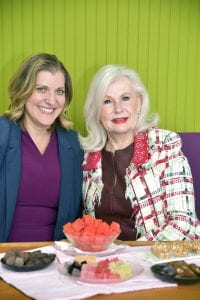
Michelle Frame, founder of Victus Ars, and Carolyn Leonard (BUS ’64), CEO and founder of the financial consultancy DyMynd.
Frame found that help in the accelerator program. The workshops provided “concrete tools, books and information to look at businesses in a new light,” she says. The program’s mentors inspired her to turn this knowledge into action, generating “impact on both the company’s growth and my ability to breathe and think.”
Particularly influential was Carolyn Leonard (BUS ’64), CEO and founder of the financial consultancy DyMynd. A serial entrepreneur and one of the first women to trade options in Chicago, Leonard taught an accelerator session on start-up fundraising. Leonard visited the candy lab and offered Frame personal guidance on her expansion plans.
“What she wanted to understand was risk, which is something that I really have a great deal of knowledge and experience with,” says Leonard. Frame told Leonard that she was wary of risk because of her upbringing on an Indiana farm, where risk was a constant threat to the family’s livelihood. “But she knew that in order to become successful and to move to the next step with her business, she would have to become comfortable with assuming greater risk,” Leonard says. “My conversation with her was that you can’t make business decisions based on unknowns, you have to make them on knowns and what you know about your business.”
The advice was an epiphany for Frame. “I was letting fear cloud my judgment,” she says. “Carolyn told me, ‘Get your foot off the brake. Put your foot on the gas. It’s time to go.’”
Frame is now working with real estate professionals to find a new building that will accommodate her business for the next five to 20 years.
Mentor advice also gave her the confidence to begin hiring. DePaul alumna Adriana Tarasiewicz (BUS ’13) joined the lab in the spring and is learning the business from the ground up from Frame.
“The connections I made with mentors have been amazing,” Frame says. “I’m in a position to move forward faster because of their insights, support and positive feedback. Having like-minded women who have gone through the same trials and tribulations share their hard-won wisdom is a huge benefit as I maneuver the business landscape.”
An Enduring Network
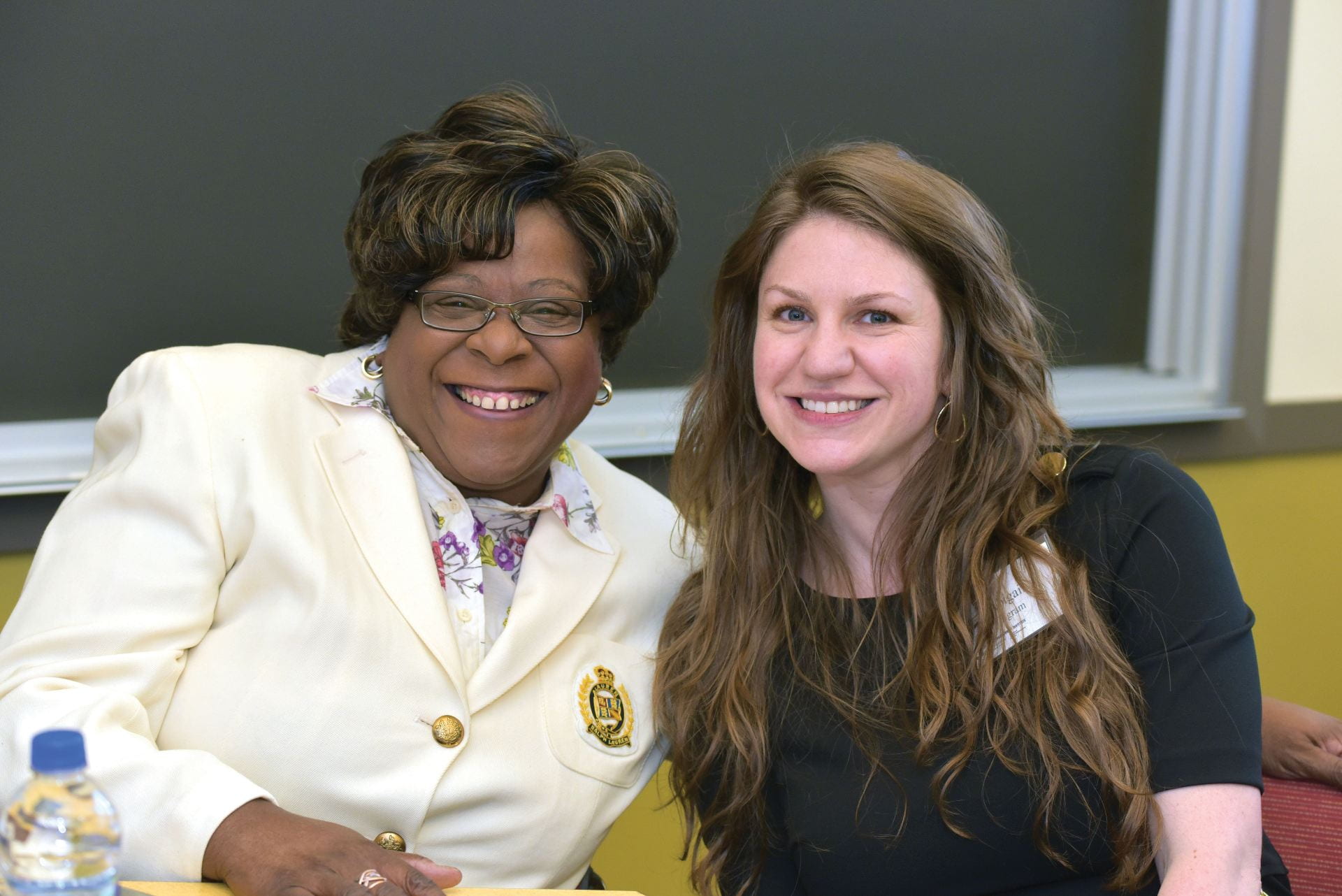
Committee member Valarie King-Bailey (left) with Abigail Ingram, director of the Women in Entrepreneurship Program.
“The nine weeks were over quickly,” says Ingram, “but the program and the connections we are building with these growing companies is not over at all.” Monthly programming now continues for the first cohort, and the women entrepreneurs are providing WEI with quarterly updates on their progress.
The preliminary outcomes have been promising. The nine companies are collectively on track to make 54 percent more revenue this year than the year before, and together they have created six new jobs so far. “If we see any red flags in this tracking,” Ingram says, “we have 40 expert entrepreneurs who are ready to step in and help fix whatever the issues might be.”
WEI is seeking an endowment and sustained funding to offer the accelerator program every quarter. Entrepreneurs are being recruited for the next cohort, which begins in January. “We hope in five years to have enough research done to show what strategies are most effective for helping women get that access to equal opportunity,” Ingram says. “We’d like to see the needle starting to move on figures involving investment, and to see more than 1.6% of women who own businesses reach a million dollars in revenue.
“Within 20 years, we hope we can shut the accelerator down because the work will be done,” she says. “That’s the real goal.”
Learn more about WEI and its accelerator program at go.depaul.edu/WEI
View an ABC7 Newsviews interview with Abigail Ingram and Joan Hannant about WEI and its accelerator program.
By Robin Florzak | Photos by Kathy Hillegonds
